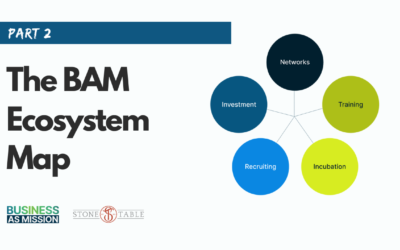Leadership Through the Lens of the Gospel, Part 2

In part 1 of this article, we explored our tendency to define leadership the same way the world does. But godly influence is not the same as fame and notoriety. Jesus must become greater, and we must become less.
Let’s continue with Part 2 and unpack a few more characteristics of Leadership through the Lens of the Gospel.
Use Influence the Way Jesus Did
At the core of our missions work at The Stone Table is a real estate company called CRF Affordable Housing. CRF is the business engine that funds our global missions investment all over the world. We’re in the affordable housing business. We own, manage, and construct apartments and assisted living facilities, and at the height of our growth, we had over 80 employees at 13 separate locations around Indiana.
We wanted our team to understand what leadership and influence meant for us. Not all of our staff are followers of Jesus, but on our weekly all-staff conference call, we began talking about how Jesus defined and modeled leadership. We didn’t want our leaders focusing on their authority over the residents, we wanted them to see their leadership and influence differently. So, we started regularly sharing these kinds of scriptures with them:
“But Jesus called them together and said, “You know that the rulers in this world lord it over their people, and officials flaunt their authority over those under them. But among you it will be different. Whoever wants to be a leader among you must be your servant, and whoever wants to be first among you must become your slave.
– Matthew 20:25-27
“Jesus knew that the Father had given him authority over everything and that he had come from God and would return to God. So he got up from the table, took off his robe, wrapped a towel around his waist, and poured water into a basin. Then he began to wash the disciples’ feet, drying them with the towel he had around him.”
– John 13:3-5
Jesus had all authority, but he didn’t use his power and position to dominate and force His way on others. Instead, he took the authority He had and brought it underneath. He used His all-encompassing influence as a means of service and sacrifice for the benefit and blessing of others, ultimately sacrificing His very life for the sake of the world.
Slowly and surely, these Gospel-centered ideas began to take root in our team. Today, the unofficial motto of CRF – from property managers, to maintenance supervisors, to leasing agents, to grounds crew – has become “we wash feet.” You’ll hear it in the daily lexicon of CRF Affordable Housing to this day.
It doesn’t matter who you are, your social status, how much money you have, the amount of authority you possess, your official position at your job. A godly leader uses their leadership and influence the way Jesus did: as service to others.
Stop Trying to Change the World
We just wrapped up graduation season. My youngest just finished high school, and not only did we host a giant graduation open house for him, we spent weeks attending graduation open houses for countless classmates and friends. It’s always this time of year when graduation cards, valedictorian speeches, and proud parent social media posts are filled with inspirational talk of changing the world!
“Get out there and make your mark on the world! Let’s be world changers!” (Throw tasseled hats into the air!).
I get it. Everything in that message resonates with how I feel about my kids, too. We want their lives to matter. We want our lives to matter. We have an innate awareness that something is wrong with the world, and we want to make it right again.
Then we graduate, settle into a job, start a family, and begin feeling like we must have missed it somewhere, because what we end up doing just doesn’t seem to matter all that much and certainly isn’t celebrated or even noticed by anyone. We were told we could be “world changers” and then all we end up changing are our kids’ diapers.
Researchers at Harvard recently released a study on happiness. The essence? Stop telling your kids they’re going to change the world. It’s setting them up for disillusionment. Instead, tell them to focus on serving the people right in front of them.
Influence the One in Front of You
We see the power of this approach to influence with many of the missionaries we work with around the world. Let’s unpack some statistics:
According to the Joshua Project, the world just ticked over 8 billion people! Forty two percent (42%) of that 8 billion are unreached with the Gospel. That’s 3,4000,000,000 human souls who will be born, live, and die without ever having the chance to hear the Good News about Jesus without cross-cultural help. We must change this reality!
According to Matthew 28:19, Jesus commissioned all of us (including you and me) to go and make disciples of all nations. That is an enormous task. So we begin to obsess about mass strategies for “changing the world.” But my friend Dick Brogden, global leader of the LiveDead pioneer missions movement, puts it in perspective:
“If we filled a stadium with 100,000 people every day, and 20,000 came to Christ every night of every week, of every year, it would take 1,000 years to reach the world. But if every follower of Jesus made one disciple and taught them to make one disciple who made one disciple, it would take us just over 30 years to reach the world. Less than a span of one generation!”
We could finish the task and fulfill the Great Commission in our lifetime if we stopped trying to “change the world” and embraced the viral subversive influence of the Gospel. Why are the fastest growing church movements in the world in places like Iran and China, places you cannot preach to masses of people?
Jesus didn’t ask you to change the world. That’s his job! He asked us to be faithful to His story! He has called us to worship him, love our neighbor as ourselves, and make disciples of every nation. Jesus poured himself into 12 disciples who transformed the arc of history! So what if we stopped trying to “change the world” and started embracing what and who God has put right in front of us. I believe that is how we will change the world.
If we are to truly leverage leadership through the lens of the Gospel, it is imperative that we utilize our influence in the same way Jesus exemplified – through service, humility, and sacrifice. This entails focusing on faithfully stewarding the opportunities that God places right before us. By embracing this principle, we embody the essence of godly leadership.
As we look ahead to Part 3 of this article, we will delve into one more pivotal characteristic of Gospel-driven leadership – one that further illuminates our journey towards transformative influence.



